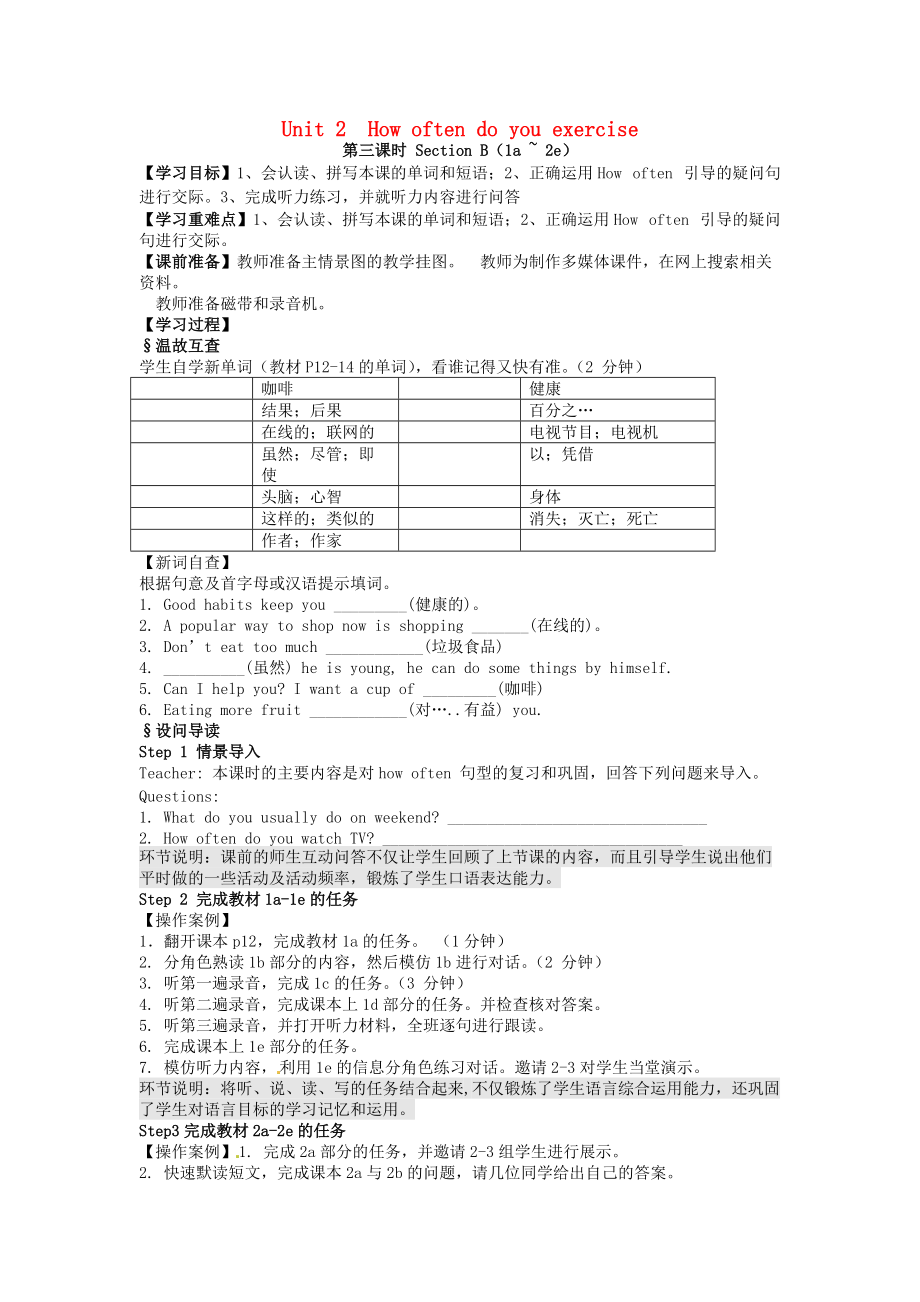《四川省瀘州市龍馬潭區(qū)八年級(jí)英語(yǔ)上冊(cè) Unit 2 How often do you exercise第3課時(shí)Section B1a2e學(xué)案無(wú)答案新版人教新目標(biāo)版》由會(huì)員分享���,可在線(xiàn)閱讀�����,更多相關(guān)《四川省瀘州市龍馬潭區(qū)八年級(jí)英語(yǔ)上冊(cè) Unit 2 How often do you exercise第3課時(shí)Section B1a2e學(xué)案無(wú)答案新版人教新目標(biāo)版(3頁(yè)珍藏版)》請(qǐng)?jiān)谘b配圖網(wǎng)上搜索�。
1���、
Unit 2 How often do you exercise
第三課時(shí) Section B(1a ~ 2e)
【學(xué)習(xí)目標(biāo)】1�����、會(huì)認(rèn)讀�����、拼寫(xiě)本課的單詞和短語(yǔ)��;2�����、正確運(yùn)用How often 引導(dǎo)的疑問(wèn)句進(jìn)行交際����。3、完成聽(tīng)力練習(xí)�����,并就聽(tīng)力內(nèi)容進(jìn)行問(wèn)答
【學(xué)習(xí)重難點(diǎn)】1��、會(huì)認(rèn)讀�、拼寫(xiě)本課的單詞和短語(yǔ);2���、正確運(yùn)用How often 引導(dǎo)的疑問(wèn)句進(jìn)行交際��。
【課前準(zhǔn)備】教師準(zhǔn)備主情景圖的教學(xué)掛圖���。?教師為制作多媒體課件,在網(wǎng)上搜索相關(guān)資料���。
?教師準(zhǔn)備磁帶和錄音機(jī)。
【學(xué)習(xí)過(guò)程】
溫故互查
學(xué)生自學(xué)新單詞(教材P12-14的單詞)�,看誰(shuí)記得又快有準(zhǔn)。(2 分鐘)
咖啡
2����、
健康
結(jié)果;后果
百分之…
在線(xiàn)的;聯(lián)網(wǎng)的
電視節(jié)目���;電視機(jī)
雖然�;盡管�;即使
以;憑借
頭腦���;心智
身體
這樣的�����;類(lèi)似的
消失��;滅亡���;死亡
作者;作家
【新詞自查】
根據(jù)句意及首字母或漢語(yǔ)提示填詞��。
1. Good habits keep you _________(健康的)��。
2. A popular way to shop now is shopping _______(在線(xiàn)的)���。
3. Don’t eat too much ____________(垃圾食品)
4. __________(雖然)
3���、 he is young, he can do some things by himself.
5. Can I help you? I want a cup of _________(咖啡)
6. Eating more fruit ____________(對(duì)…..有益) you.
設(shè)問(wèn)導(dǎo)讀
Step 1 情景導(dǎo)入
Teacher: 本課時(shí)的主要內(nèi)容是對(duì)how often 句型的復(fù)習(xí)和鞏固���,回答下列問(wèn)題來(lái)導(dǎo)入。
Questions:
1. What do you usually do on weekend? ________________________________
4�����、
2. How often do you watch TV? _____________________________________
環(huán)節(jié)說(shuō)明:課前的師生互動(dòng)問(wèn)答不僅讓學(xué)生回顧了上節(jié)課的內(nèi)容�����,而且引導(dǎo)學(xué)生說(shuō)出他們平時(shí)做的一些活動(dòng)及活動(dòng)頻率��,鍛煉了學(xué)生口語(yǔ)表達(dá)能力�。
Step 2 完成教材1a-1e的任務(wù)
【操作案例】
1.翻開(kāi)課本p12,完成教材1a的任務(wù)����。 (1分鐘)
2. 分角色熟讀1b部分的內(nèi)容,然后模仿1b進(jìn)行對(duì)話(huà)��。(2 分鐘)
3. 聽(tīng)第一遍錄音���,完成1c的任務(wù)���。(3 分鐘)
4. 聽(tīng)第二遍錄音,完成課本上1d部分的任務(wù)����。并檢查核對(duì)答案。
5. 聽(tīng)第三遍錄音���,
5�、并打開(kāi)聽(tīng)力材料�����,全班逐句進(jìn)行跟讀�����。
6. 完成課本上1e部分的任務(wù)�����。
7. 模仿聽(tīng)力內(nèi)容�,利用1e的信息分角色練習(xí)對(duì)話(huà)。邀請(qǐng)2-3對(duì)學(xué)生當(dāng)堂演示��。
環(huán)節(jié)說(shuō)明:將聽(tīng)、說(shuō)�、讀、寫(xiě)的任務(wù)結(jié)合起來(lái),不僅鍛煉了學(xué)生語(yǔ)言綜合運(yùn)用能力�,還鞏固了學(xué)生對(duì)語(yǔ)言目標(biāo)的學(xué)習(xí)記憶和運(yùn)用。
Step3完成教材2a-2e的任務(wù)
【操作案例】1. 完成2a部分的任務(wù)����,并邀請(qǐng)2-3組學(xué)生進(jìn)行展示。
2. 快速默讀短文����,完成課本2a與2b的問(wèn)題,請(qǐng)幾位同學(xué)給出自己的答案��。
3. 讀課本2c中的問(wèn)題��,帶著問(wèn)題閱讀短文����,完成課本2c部分的任務(wù)。
4. 學(xué)生再一次閱讀短文���,完成教材2d的任務(wù)�����。
5. 完成教材2e的任
6����、務(wù)����。并要求學(xué)生與自己的同伴進(jìn)行調(diào)查練習(xí)。
自我檢測(cè)
根據(jù)2b完成短文
Last month we 1________ our students 2______ their free time activities. Our questions were about exercise, 3___________________and 4__________ . Here are the results.
We found that only fifteen percent of our students exercise every day. Forty-five percent
7����、exercise four to six times a week. Twenty percent exercise only one to three times a week. And twenty percent 5_____ exercise 6____!
We all know that many students often 7_______, but we 8___________ ninety percent of them use the internet every day. 9________ ten percent use it 10________ three
8、or four times a week. Most students use it for fun and not for homework..
11_________________________ also interesting. Only two percent of the students watch TV one to three times a week. Thirteen percent watch TV four to six times a week. And eighty-five percent watch TV every day! Although ma
9����、ny students like to watch TV sports, game shows are the most popular.
It is good to relax by 12__________________, but we think 13__________ is through exercise. 14________________.
Exercise 15________ playing sports is fun, and you can 16___________ your friends and family as you play together
10、. And remember, “old habits die hard”. So start exercising before it’s too late!
鞏固訓(xùn)練
選擇
( )1)__________do you drink coffee? -----Twice a day.
A. How many B. How long
C. How soon D. How often
( )2) My teacher wants me _________ hard.
A. study B. studying C. t
11���、o study D. studies
( )3) Eating fruit and vegetables _____________ our health.
A. is good to B. is good C. is good for D. is well for
( )4) Miss Liu is very ________, because she exercises every day.
A. health B. healthy C. unhealthy D. unhealth
(
12��、)5)Thank you for _______ me with my English.
A. help B. to help C .helping
( )6) _______ milk do you drink?
A. How many B. How much C. How often D. How soon
( )7.Don’t read in bed. It’s bad ___ your eyes. A. for B. of C. with
( )8.I try to eat
13�����、 junk food once a week _____ I love it very much.
A. although B. through C. but
( )9.Jenny _____ lifestyle.
A. has a healthy B. have a healthy C. has a health
( )10.If you want to be healthier, you must eat ____ junk food, I think.
A. more B. less C. fewer
( )11.I try ____ v
14�����、egetables eleven times a week.
A. eat B. eating C. to eat
( )12.Eating more vegetables helps you to keep ________ good health
. A. for B. in C. to
( )13.Is Katrinas life the same ____ (和……’同)yours?
A. as B. to C. with
拓展研究(詳見(jiàn)學(xué)生訓(xùn)練部分P.10)
課堂小結(jié)
作業(yè)
課后反思
我國(guó)經(jīng)濟(jì)發(fā)展進(jìn)入新常態(tài)�,需要轉(zhuǎn)變經(jīng)濟(jì)發(fā)展方式,改變粗放式增長(zhǎng)模式�,不斷優(yōu)化經(jīng)濟(jì)結(jié)構(gòu),實(shí)現(xiàn)經(jīng)濟(jì)健康可持續(xù)發(fā)展進(jìn)區(qū)域協(xié)調(diào)發(fā)展�,推進(jìn)新型城鎮(zhèn)化,推動(dòng)城鄉(xiāng)發(fā)展一體化因:我國(guó)經(jīng)濟(jì)發(fā)展還面臨區(qū)域發(fā)展不平衡��、城鎮(zhèn)化水平不高����、城鄉(xiāng)發(fā)展不平衡不協(xié)調(diào)等現(xiàn)實(shí)挑戰(zhàn)。
 四川省瀘州市龍馬潭區(qū)八年級(jí)英語(yǔ)上冊(cè) Unit 2 How often do you exercise第3課時(shí)Section B1a2e學(xué)案無(wú)答案新版人教新目標(biāo)版
四川省瀘州市龍馬潭區(qū)八年級(jí)英語(yǔ)上冊(cè) Unit 2 How often do you exercise第3課時(shí)Section B1a2e學(xué)案無(wú)答案新版人教新目標(biāo)版

